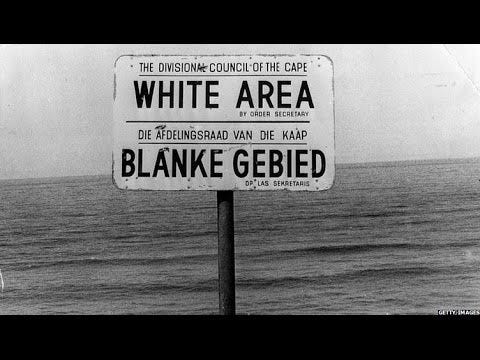How Apartheid Socialism Killed White Privilege
Written by: Anthony Stuurman
It seems to have become quite fashionable for white left-leaning, woke and mostly vegan types to confess their 'white privilege' and take their dates on 'privilege walks' instead of good, old-fashioned 'Netflix and chill'. I'm not sure why they do this, but what I am sure about is: No matter how much they 'believe', they don't actually have 'white' privilege.
There is no question that Apartheid policy was fundamentally oppressive towards blacks, coloureds, and Indians. However, it does not logically follow that the same policy must automatically benefit whites. Just because Apartheid policy was intended to benefit whites, doesn’t mean this was true in practice.
Let us take the most visibly-oppressive law in the Apartheid catalogue: The Group Areas Act. Did whites benefit and thereby were privileged by this Act?
Imagine a scenario where a commercial sector is heavily regulated by the state. Restrictions are put in place, meaning that the industry is banned from selling to 90% of the population. Then add another restriction that imposes a price control on the product that is so low, it makes it difficult to maintain the quality of the product, let alone make a profit.
Sounds crazy, right? Who in their right mind would think this kind of economic policy actually benefits either the consumer, or even the producer?
SEE ALSO: 7 Reasons Why Apartheid Was Not ‘Capitalist’ by Martin van Staden
The thing is, this scenario isn’t imaginary. Welcome to Apartheid-era South Africa.
In the 1950s, Hillbrow was a vibrant, cosmopolitan and upwardly-mobile part of Johannesburg. As the Group Areas Act began to be applied, by 1965, non-whites, who made up an estimated 25-35% of Hillbrow’s population, had been forced out. Rent controls were also introduced to properties occupied by low-income tenants.
Within ten years, the Hillbrow property market was in an untenable position. Landlords could neither fill properties nor collect enough rent to maintain their upkeep. Living conditions deteriorated and crime exploded in the area. Those that could afford it, were forced to live in suburbs further out. Local businesses struggled to stay open.
Multiple protests by white residents followed. Even Anglo-American, a major property owner, lodged formal complaints with the state. Decades on, even post-Apartheid, Hillbrow has yet to fully recover.
This phenomenon was not confined to Johannesburg. In Cape Town, everyone has heard of the destruction of District Six, however, less well known, is that the majority of bulldozed properties were in fact white-owned. Even sleepy coastal towns like East London were hard hit. Today, in East London’s Quigney area, rent controls and racial segregation were so damaging that properties still suffer from a legacy of poor maintenance. Even today, they often have to be gutted and rebuilt on resale, as they can’t even pass basic electrical inspections.
The notion that all whites benefited from Apartheid is fundamentally a myth. Whites couldn't be privileged by a system that imposed absurd regulation on economic behaviour and infringed on basic property rights. Apartheid rigged the system in a way that prevented the majority of South Africans, both white and black, from benefiting from a free economy.
Ironically, economists from Witwatersrand and other institutions had been warning of the negative economic implications of segregationist policies for whites as early as the 1950s. The Nationalists, of course, just like the woke whiteys of today, were too ideologically-driven to give it a moment of thought.
There is an essential lesson to learn from Apartheid. Ideologically, Apartheid was a kind of quasi-socialism. Whether it be central planning, social engineering, a police state, or a lack of property rights, how was it not a socialist state? Socialism never works.
In the same way, in modern South Africa, the African National Congress has rigged the economy through socialist policy, unless, of course, you are politically-connected. In this context, white privilege, (or Indian privilege, coloured privilege, or the socialists’ old favourite, Jewish privilege) is just a politically-loaded concept that misdirects the voting public, while the real heist (VBS, Nkandla, ghost teachers, etc.) is underway.
To paraphrase Jay-Z: South Africa has 99 problems, and white privilege ain't one of them.
Anthony Stuurman (a pen-name) is a regular Contributor at the Rational Standard. The writer is an educator in the Eastern Cape with an interest in neuroscience, ethnobotany and a passion for free speech.




